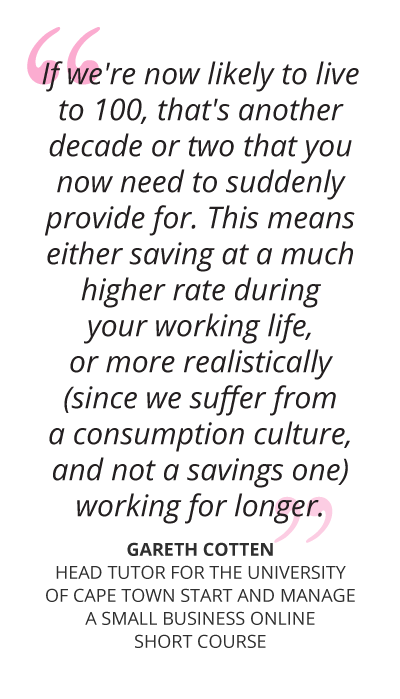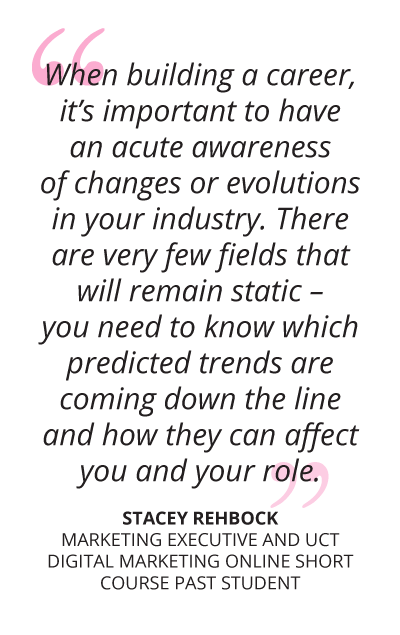What If You Lived to 100? How Longer Lives Are Changing the Way We Work

What would you do with your life if you knew you would live to 100? This is a question post-millennials may soon have to answer, and one we should all give more thought to.
Human life expectancy has been increasing by up to three months per year for over a century, and there is no sign of it slowing down. In their book The 100 Year Life, Authors Lynda Gratton and Andrew Scott draw on a 2009 study1 to show that if the trend continues, more than half the people born in wealthier countries after 2000 may indeed see their 100th birthdays.
But what does this really mean for their life, career, and inevitable retirement?
Putting retirement on hold
With improved longevity, delayed retirement is becoming a real consideration for those in the current workforce. Whether it’s through choice or financial need, new professionals are starting to leave the corporate world later than ever before. In fact, practically all Western countries are seeking to shift the age of retirement past 65 and place it more in line with our future life expectancies.2
According to a census conducted in 2015, 53.5% of 65-year-old men and almost 39% of women were still active in the workforce3 – and these numbers are only expected to grow as we look to set ourselves up adequately for retirement.
“With us now likely to live longer, we need to be cognisant of the fact that retirement savings as we know them may be insufficient. The average retirement plan is premised on someone working until 65, and then having another 15-20 years to live, with the assumption that you’ll effectively use up your savings in your lifetime,” says Gareth Cotten, Head Tutor for the University of Cape Town Start and Manage a Small Business online short course. “If we’re now likely to live to 100, that’s another decade or two that you now need to suddenly provide for. This means either saving at a much higher rate during your working life, or more realistically (since we suffer from a consumption culture, and not a savings one) working for longer.”

As stated by Harvard Business Review4, unless people are prepared to put away a lot more, those in their mid-40s are likely to work until their early 70s; and for workers in their early 20s, there is a real chance they will need to work until their late 70s or possibly even into their 80s.
Tie this to how quickly the job market changes, and it re-emphasises how important it is to stay on the front foot with ongoing learning and re-skilling.
Upskilling as a prerequisite
As our careers could potentially reach a span of up to six decades, the education we obtain in early adulthood will simply not be enough to keep us qualified over the many years that follow. According to the World Economic Forum5, 35% of the skills that workers need – regardless of industry – will have changed by 2020.
In an age defined by emerging tech, it’s expected that, at best, your job skills will be outdated within three to five years, and at worst, your industry could become obsolete altogether. This makes the concept of lifelong learning an absolute necessity if you want to not only stay relevant but keep growing in the face of disruption.
Marketing Executive and UCT Digital Marketing online short course past student, Stacey Rehbock
says, “When building a career, it’s important to have an acute awareness of changes or evolutions in your industry. There are very few fields that will remain static – you need to know which predicted trends are coming down the line and how they can affect you and your role.”

By keeping up to date with the changes, you’re able to seek out the skills you need to stay at the top of your game. Whether this is through internal training or online learning, continuously upskilling yourself over the course of your career is the key to staying relevant long after you’ve joined the workforce.
With the growing pressure to save more, an increasing number of professionals are also seeking out additional revenue streams to supplement their main employment. Learning a new skill set can help you to build your own side business in order to put more money away for a longer retirement.
Reinventing the phases of life
Over the past 70 years or so, the typical employee has largely followed a traditional ‘three-stage life’ path: education, career, and retirement. It’s a pattern with which the business world has become very comfortable. But this way of livin g is quickly changing.
When someone is expecting to live for longer, the traditional life model can transform into something much more complex, allowing them to pivot and reinvent themselves over and over. For many, this means taking on multiple career paths and wearing many hats throughout their lives. Whether they quit their job to start their own business, or take on a completely new industry halfway through their career, continuing education and a longer working life are giving new professionals the freedom to explore all that the working world has to offer.
In an evolving and connected world where information and resources are right at your fingertips, being a lifelong learner may be a necessity, but it’s also easier than ever before to achieve.
Are you prepared for the future?
Develop new skills to stay relevant
